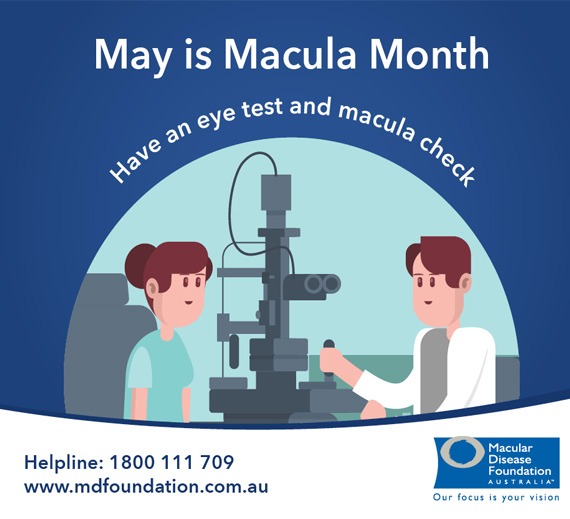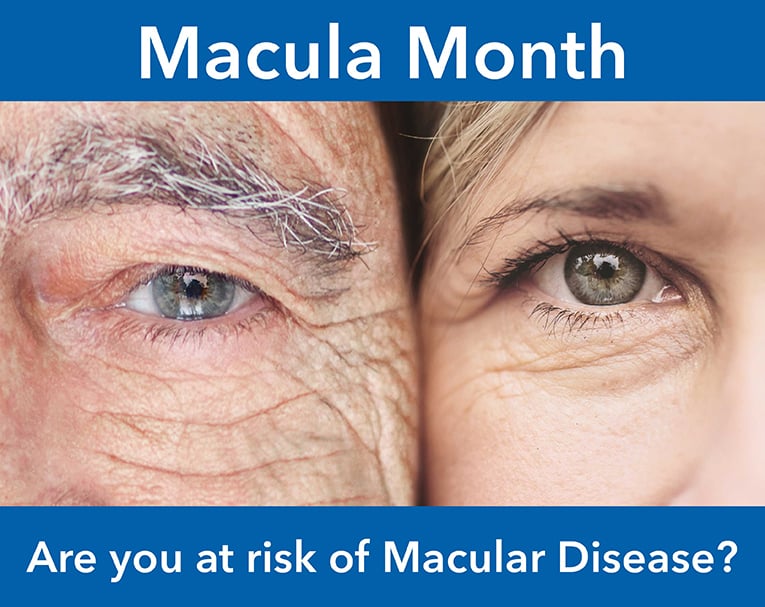May is Macula Month

Macula disease is the leading cause of blindness and severe vision loss in Australia. Apar of the Macula Month Awareness campaign, Beckenham Optometrist is encouraging our community to learn about their risk and take action to protect their sight.
The most common macular disease is age-related macular degeneration (AMD), a chronic and progressive disease of the macula, which can lead to loss of central vision.
One in seven Australians over the age of 50 – about 1.3 million people – have some evidence of AMD but may not know it because the earlier stages of the disease typically have little or no impact on vision, AMD can be diagnosed with a comprehensive eye examination that includes a macula check.

WHAT IS THE MACULA?
The macula is part of the retina at the back of the eye. It is only about 5mm across but is responsible for all of our central vision, and for sharp, clear, straight-ahead vision, most of our colour vision, and the fine detail of what we see. The macula has a very high concentration of photoreceptor cells that detect light and send signals to the brain, which interprets them as images. The rest of the retina processes our peripheral vision.
Macular disease causes loss of central vision.
WHAT CAUSES MACULAR DEGENERATION?
We don’t know the cause of age-related macular degeneration, but we do know that there are certain risk factors for the development of age-related macular degeneration. Research indicates it may be related to a combination of heredity and environmental factors, including smoking and diet.
WHAT IS THE DIFFERENCE BETWEEN WET AND DRY MACULAR DEGENERATION?
- Dry (atrophic): caused by the gradual atrophy (loss) of retinal cells. It may lead to a gradual loss of central vision. Currently, there is no treatment available for the dry form. Research is being conducted to develop treatments.
- Wet (neovascular): caused by the formation of fragile blood vessels which leak fluid and blood within and under the retina. It often leads to a rapid loss of central vision. Loss of vision in one eye may go unnoticed if vision in the fellow eye is good. Regular vision testing of each eye, in turn, is recommended.
People with dry macular degeneration don’t have these abnormal or fragile blood vessels yet, but they are at an increased risk for developing the vessels at some point.
CAN YOU GET MACULAR DEGENERATION IN ONE EYE OR DOES IT ALWAYS OCCUR IN BOTH?
It is possible to develop it in only one eye. However, as the disease progresses both eyes may become affected. If an individual has macular degeneration in one eye, he or she is more likely to develop it in the other eye than someone who does not.
The biggest issue with macular degeneration is that it generally doesn’t have symptoms in the early stages for most people, especially, if the problem in the back of their eye is their non-dominant eye. Your non-dominant eye is like your non-dominant hand, if you are right-handed, that’s your dominant hand. If you hurt your left hand it never affects you as much, because everything you do is right-handed. This is similar to what happens in your vision. If the cells start to die in the back of the eye, which is what causes the problem, then you get little bits of the retina missing, and when that retina starts to miss, if it is not missing in the dominant eye then patients don’t actually notice it.
This is the reason it is really important for patients, especially once over 65, but definitely, once they are over 50, to visit an optometrist, so that we can find these defects early, and before they notice that they have a problem, because, by this time, any loss of vision could be irreversible.
The biggest issue is, if patients get macular in their better or more dominant eye, that loss of independence for older people is what creates huge problems. That is the issue that I always try to emphasise. That regular eye examination will help keep you independent, keep you living at home, keep you doing what you want to do, and likely stop you from having to lose your driver’s license.
FAMILY HISTORY AND AGE ARE THE MAIN RISK FACTORS, ARE THERE ANY OTHERS?
Factors that may increase your risk of macular degeneration include:
- Age. This disease is most common in people over 50.
- Family history. This disease has a hereditary component. Researchers have identified several genes related to developing the condition.
- Race. Macular degeneration is more common in white people.
- Smoking. Smoking cigarettes or being regularly exposed to smoke significantly increases your risk of macular degeneration.
- Obesity. Research indicates that being obese increases the chance that early or intermediate macular degeneration will progress to a more severe form of the disease.
- Cardiovascular disease. If you have diseases that affect your heart and blood vessels, you may be at higher risk of macular degeneration.
50% of patients that have macula also have a family member that has been affected with macula degeneration.
Our top tips for optimal macular health are:
- Visit one of our optometrists once every two years if you are 50 years and over (every year if over 65), or as advised by your eye health professional, to look for early signs of AMD.
- Don’t smoke – smokers are at 3 to 4 times higher risk of AMD than non-smokers
- Exercise regularly and eat a macula friendly diet – fish two or three times a week, dark green leafy vegetables and fresh fruit daily, and a handful of nuts once a week can help reduce the risk of AMD
- Protect your eyes from sunlight exposure
The best way to protect your eyes is to have an eye exam. There is currently no treatment for dry macular degeneration but treatments are available for wet macular degeneration that is aimed at maintaining the vision for as long as possible. For the wet form of the disease, some common treatments that can help control the abnormal blood vessel growth and bleeding in the macula include injections, laser surgery, and photodynamic therapy. For long-term healthy eyesight, it is vital to have a comprehensive eye exam every 2-3 years. If over 65 years of age, annual exams are recommended. If there are other risk factors, more regular checks may be required.
Make sure to book an appointment with one of our Optometrsit, to give your vision the best chance. Beckenham Optometrist has been operating in Avalon for 22 years and our team is passionate about delivering the most comprehensive level of eye care to the community through a personalised and friendly approach. Beckenham Optometrist can be contacted on 9918 0616 or at info@beckenhamoptometrist.com.au.







